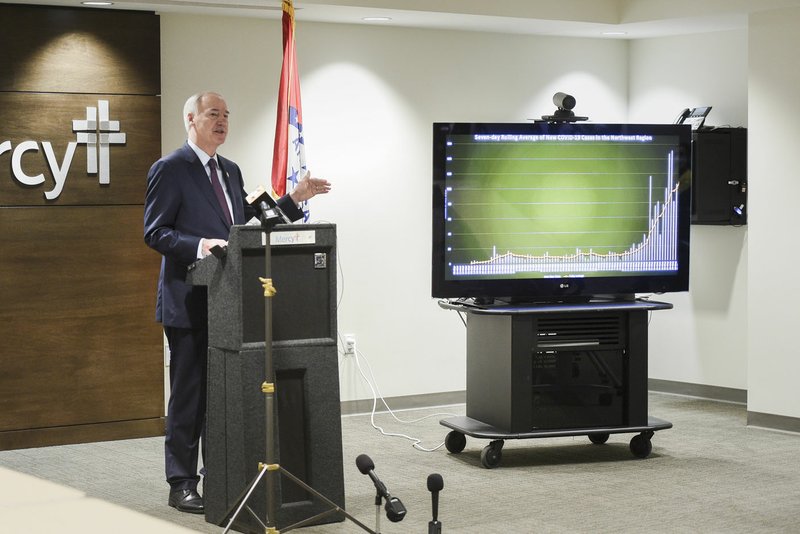Most of the time a visit from the governor is a welcome event for a community. It often means some kind of economic development announcement or a tour of an outstanding facility the governor wants to recognize.
By what we know of his trip to Rogers Monday, it might be better this time if the governor didn't have a reason to visit.
What’s the point?
Residents of Northwest Arkansas are getting covid-19 at a faster rate than ever. It’s up to everyone to do something about it.
Gov. Asa Hutchinson's almost daily press conferences live-streamed on YouTube have become must-see watching for a lot of Arkansans concerned about how well -- or not so well -- the state is doing in the effort to reduce the spread of the coronavirus, which causes the covid-19 illness.
The troubling news is that Northwest Arkansas isn't doing so great.
In a way, our neck of the woods has been spoiled. Since Arkansas reported its first case on March 11, Northwest Arkansas hasn't seen the dramatically high case counts of some of the state's other areas, such as Little Rock. In recent days, though, that's changed.
Washington County has become the state's hot spot for new covid-19 cases, at least as of Friday. Dr. Nate Smith, secretary of the Arkansas Department of Health, said on Friday that Washington County led the state for the previous 24 hours with 53 cases. Benton County had the second-most cases during that period at 38 cases.
The region, Dr. Smith said, is also the only part of the state where the number of hospitalizations are on the rise.
Arkansas has far exceeded its goal for testing in May, with more than 70,000 completed. So, yes, some of the growth can be attributed to getting a more accurate measure of the spread statewide. Northwest Arkansas' growth in hospitalizations, though, also help confirm that it's more than just testing -- that the actual number of cases is rising.
Northwest Arkansas usually celebrates growth, but not with these numbers. It's clear the governor's visit Monday is recognition that the region is a trouble spot in battling the virus.
Some will claim that's because Hutchinson has allowed businesses to open. Last week, he and Dr. Smith said they've been watching those numbers carefully. Among the new cases reported since bars, stores, venues and other facilities have begun to reopen, the state's tracing of contacts shows tiny percentages arising from those activities.
It's important not to overreact and place blame where it doesn't belong. Why go back and close down businesses if doing so would have little or no impact on the virus' spread? We don't know how long the coronavirus is going to be around, which means we've got to figure out ways to stem the spread while returning people to work and reinvigorating the state's economy.
The Arkansas Department of Health, Smith has said, has expanded its contact tracing capacity with hundreds of employees. Rapidly collecting data on where the contagion is being spread is the key to addressing the pandemic without returning to more closures that will mean economic ruin for many Arkansans.
In this region, meat processing plants have been identified as places where transmission of the virus is more likely. Yet our nation depends on such essential industries to keep meat in grocers' refrigerators and freezers. Clearly, though, any outbreak at a particular plant needs close attention by state health officials. Workers need protections. And the numbers suggest the tactics deployed so far are not adequately staving off the transmission of coronavirus among populations employed by the industry.
Employers have a great responsibility to their employees and the greater community, but as Hutchinson has pointed out several times, individual responsibility is the foundation of Arkansas' campaign to stop the spread.
Of the state's 1,699 active cases on Friday, about a quarter of those infected with the virus were Latino. So it's vital state and local leaders step up their efforts to educate not just the population in general, but minority populations seeing evidence of covid-19's spread within their communities and workplaces.
Hutchinson said Friday he'll meet with leaders of minority communities Monday to promote the practices health officials say are necessary to reduce the spread: social distancing of at least six feet from others, washing hands frequently, and people wearing masks over their mouths and noses to keep from spreading the disease if they become infected.
An astonishing number came from Smith at Friday's press conference: "Of all of our cases, about half of them have reported no symptoms at the time they were tested, but of the individuals who tested positive in our local health units, 74 percent of them recorded no symptoms."
What's that tell us? It's a reminder that many people infected with covid-19 do not know they have it. They lack symptoms and feel they can go about their normal routines. All the while, those folks are infecting others.
Finally, Smith has said Northwest Arkansas' numbers include plenty of younger people. Indeed, statewide the largest percentage of cases fall into the 25 to 44 age bracket, at 39 percent, and next highest is the 45 to 64 group, at 31 percent. These age groups as a whole are not as severely affected by covid-19 as people over 65 and those with additional health conditions, but they're also more actively moving about, making contact with others, increasing the odds they will spread the infection.
We agree with Hutchinson that, as with so many aspects of life, the real answers will be found in personal responsibility and discipline. With summer here, maybe there's a temptation to throw caution to the wind, to attempt to return to how we lived before this pandemic. But here's the best prescription: Don't.
Commentary on 05/31/2020

